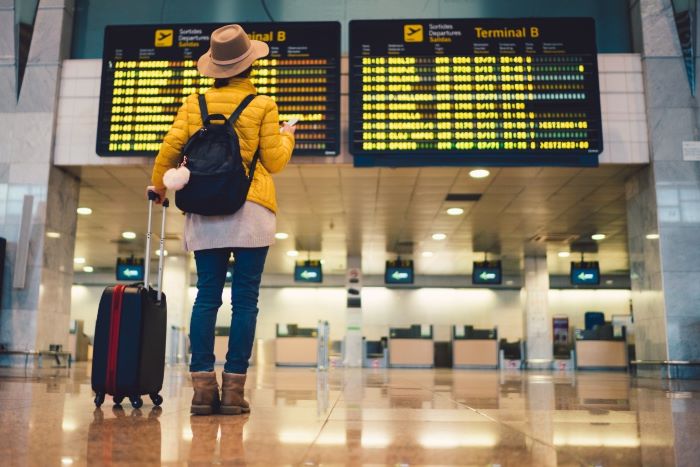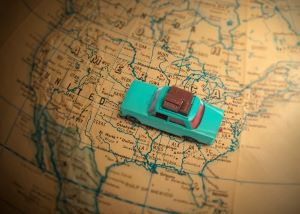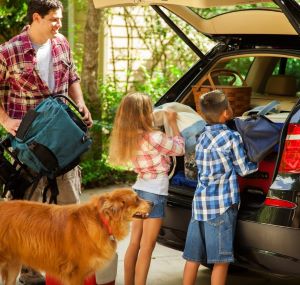
"This is no longer a vacation. It’s a quest. It’s a quest for fun. You’re gonna have fun, and I’m gonna have fun. . .” Clark Griswold
Highways, train stations, bus ways and airports experience their own type of holiday bloat, packed to the gills with frantic travelers trying to get to their destination. It can be hectic, nerve-wracking and stressful. If you have ever seen any of National Lampoon’s Vacation movies and traveled cross-county during the U.S. holiday season, then you know first-hand how Griswold misadventures and shenanigans can quickly become a fiction-based reality starring your family and you.
With nearly an estimated one third of Americans traveling, the U.S. Department of Transportation reports the Thanksgiving , Christmas and New Year’s holidays as the busiest long-distance travel periods of the year. Whether you are traveling by plane, train, or automobile, some forethought and preparation can help you stay safe, healthy and sane on your travels.
It doesn’t matter if your holiday “quest for fun” involves an exotic destination or you are making that annual trek to visit family for Thanksgiving, you can save yourself from a Griswold vacation with these travel safety tips:
 Before You “Hit the Road”
Before You “Hit the Road”
- Prepare your home to appear occupied if you will be gone for an extended period. Maintain the lawn, and make arrangements for someone to collect mail and packages, or arrange a temporary hold on your mail. If possible, use light timers. Ask a neighbor to park in driveway periodically—anything that makes it look you are not gone for an extended time period.
- If you have an alarm system, make sure it is activated and you inform your alarm monitoring company how to contact you if a breach is identified.
- Ensure water lines are not left on and unplug appliances. If there is chance of a freeze while you are out, insulate external pipes prior to departure.
- Communicate your travel plans and contact information to family or close friends so if something unexpected happens, your whereabouts and itinerary are known.
- Leave or advise the location of current legal documents, such as will, power of attorney and insurance documents with a family member or friend.
- Inform your bank, credit card and mobile phone providers of your travel dates and destination to avoid any interruption of service for perceived fraudulent activity.
- If traveling internationally, ensure your passport or Visa and inoculations are order and that your phone is optimized for international voice and data plans. Bring copies of your passports with you and store them separately from the originals.
- Check weather and travel advisories pertaining to your route and pack and prepare accordingly.
 If Traveling by Car
If Traveling by Car
- Service your car prior to your departure.
- Check tires, oil, and fluid levels and that your brakes are in good condition.
- Check that your emergency kit and car tools are complete and in working order.
Pack Like a Pro
- Traveling light will allow you to more easily manage baggage and move quickly through transit stations/terminals with less physical strain and distraction. Pack mix-and-match clothing that can be combined and layered.
- Pack necessary medication in their original labeled containers and bring prescriptions with you in case refills are needed or to prove their legality.
- Bring appropriate identification and insurance information.
- Stay connected. Remember your chargers and consider purchasing a mobile “hotspot” and charger in the event your battery runs low and you can’t find a charging station or Wi-Fi is unavailable.
- Pack hand sanitizer, tissues, and hand-wipes to help keep germs at bay.
- Limit credit cards to one or two and only carry small amounts of cash.
- Pack a travel first aid kit and over the counter medication in case of an emergency.
What NOT to Pack
- Valuables such as expensive jewelry, clothing and irreplaceable or sentimental items should be left at home.
- Do not wear expensive items of clothing or jewelry. If you are perceived as an affluent tourist, your travel risk increases.
- Leave unnecessary credit cards, Social Security card or other items you might normally carry. Only bring the essentials to minimize your risk of loss.
 Best Travel Safety Practices
Best Travel Safety Practices
- Don’t wear headphones or walk through public, high traffic areas talking on your phone. Stay situationally aware at all times.
- Keep your valuables close to your body in zipped, secured pockets or bags. Cross body bags worn under a jacket provides best protection.
- If you are lost find a safe place to get your bearings—whether in a public transit area or traveling by car.
- Report any suspicious activity to local authorities or security as soon as possible.
Whether you stay home or hit the road, we wish you a safe and happy holiday season.
Stay vigilant!









